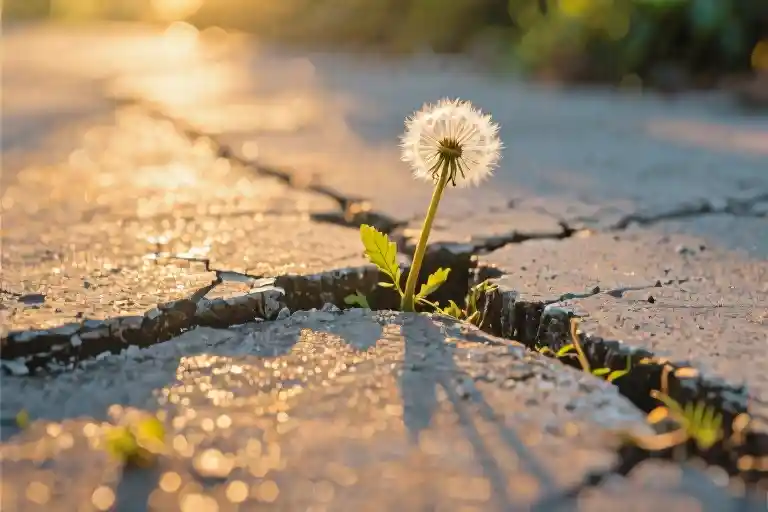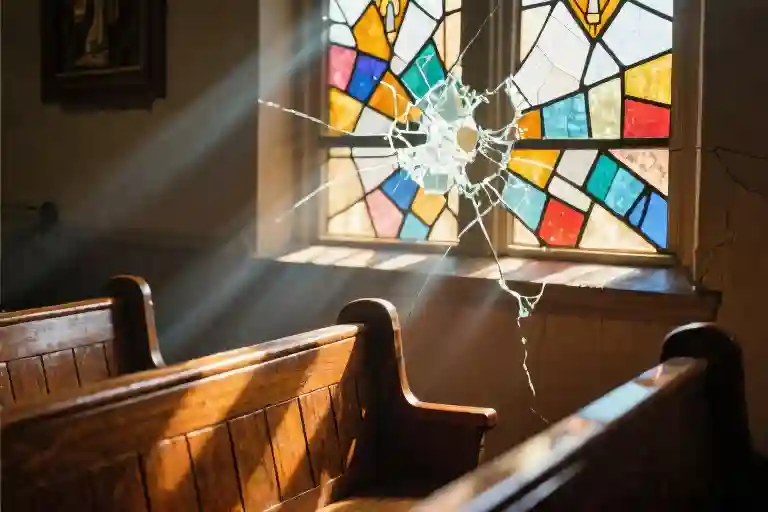There’s a peculiar stillness that settles in when you hit rock bottom. The world doesn’t actually stop moving, but your corner of it feels suspended – like you’re watching life through frosted glass. Your phone might keep buzzing, but the messages feel distant. People still ask “how are you?” but the question hangs heavy between you. This is when life teaches you instructions no e-book ever could, in a language only the broken-hearted and the lost can truly understand.
Remember that moment when you first realized some relationships were seasonal? When the people you expected to stand by you suddenly became busy, while unexpected faces appeared with quiet support? These are the paradoxes of difficult times – the way emptiness reveals what truly matters. The silence becomes a mirror, showing you reflections you might have avoided in brighter days.
What do you see when everyone leaves? Not just who walked away, but what remains within you. There’s an unshakable core that even you didn’t know existed – the part that keeps breathing when breathing feels impossible, that drags you out of bed when every bone aches with weariness. This isn’t the Hollywood version of strength with dramatic music and flawless victories. This is real resilience: standing up with shaky legs, washing one dish when the sink is full, sending one job application when rejection stings fresh.
The beautiful irony? In losing so much, you gain the rarest perspective. Without the constant noise of social obligations and performative happiness, you finally hear your own thoughts clearly. That internal voice you’ve been drowning out with busyness and distractions suddenly has space to speak. It might whisper uncomfortable truths at first – about compromises you’ve made, needs you’ve ignored, or dreams you’ve postponed. But if you listen patiently (and patience is another gift of hard times), it will eventually reveal your deepest wisdom.
Right now, the path forward might look impossibly steep. But this very moment contains the seeds of transformation. The relationships that survive will be forged in authenticity. The lessons learned will bypass your intellect and settle in your bones. The person emerging from this trial won’t be who you were before – and that’s not tragedy, but evolution. Life at its lowest prepares you for the best yet to come, not despite the struggle, but because of it.
The Truth About Rock Bottom: Life’s Required Course
We’ve all been there—that moment when the ground seems to crumble beneath your feet, when the weight of the world presses down until breathing feels like a conscious effort. This isn’t failure. This is humanity. Some of history’s most transformative stories began precisely here, in what we mistakenly call ‘the end.’
Consider Steve Jobs’ 1985 ousting from Apple, the company he co-founded. At 30 years old, publicly dismissed from his life’s work, he described it as “a very public failure.” Yet this crushing blow became the fertile ground for NeXT and Pixar—ventures that would ultimately redefine his legacy. Like winter preparing the soil for spring, his lowest point contained invisible seeds of rebirth.
Modern psychology confirms what ancient wisdom traditions always knew: struggle isn’t the opposite of growth; it’s often the prerequisite. Research from the University of Buffalo reveals that individuals who’ve navigated moderate adversity develop greater emotional resilience than those who’ve faced either extreme hardship or smooth sailing. Your current valley? It’s not a detour from your path—it is the path.
Three truths emerge when we stop fearing the fall:
- Universal Experience: 78% of successful entrepreneurs report at least one major professional failure (Harvard Business Review)
- Necessary Recalibration: Like forest fires that clear deadwood, crises expose what no longer serves us
- Hidden Preparation: Neural studies show problem-solving during stress creates lasting cognitive adaptations
That hollow feeling in your chest? It’s not emptiness—it’s space being cleared. The exhaustion in your bones? Not weakness, but your body’s wisdom saying “pause.” As the ancient Japanese art of kintsugi teaches, broken places repaired with gold become the most radiant parts of the whole.
“But in the darkest hour,” as the poet wrote, “the stars begin to appear.” Your current lessons may still be whispering—too soft to hear over the noise of disappointment. Lean in. The curriculum of the valley includes subjects no university offers: the physics of falling and flying, the chemistry of tears transforming into wisdom, the astronomy of finding constellations in chaos.
What if this isn’t the end of your story, but the crucial scene that makes the triumph meaningful? The next chapter doesn’t erase this one—it grows from its roots. After all, the mightiest oaks weather the strongest winds not despite their deep roots, but because of them.
The Gifts of the Valley: Five Lessons Pain Brings You
When you’re standing at the bottom, the world looks different. The air feels heavier, the colors seem duller, and every step forward appears impossibly difficult. But in this quiet space where life has stripped away all distractions, you begin receiving the most valuable gifts you’ll ever unwrap. These aren’t the kind of presents that come wrapped in shiny paper – they’re lessons etched into your bones, wisdom carved by experience that no classroom could ever teach.
Gift 1: The Truth About Relationships
When the music stops playing and the crowd disperses, you’ll see who remains standing beside you. Hardship acts as a filter for your relationships, separating fair-weather companions from those willing to sit with you in the darkness. You’ll remember the friend who showed up with groceries when you couldn’t leave your apartment, the colleague who covered your shifts without being asked, the family member who listened without offering unsolicited advice.
This painful clarity becomes your relational compass. You learn that depth matters more than quantity, that presence speaks louder than promises. As you rebuild, you’ll carry this understanding forward – investing in connections that can withstand life’s storms rather than those that only flourish in sunlight.
Gift 2: Discovering Your Resilience
“Strength isn’t about never falling,” you whisper to yourself as you wipe away another round of tears, “but about standing up again, despite shaky legs.” In your lowest moments, you’ll surprise yourself. That morning you forced yourself out of bed when every cell protested. The time you apologized after an emotional outburst. The day you completed one small task despite the overwhelming urge to surrender.
These microscopic victories accumulate into an unshakable knowing – you are far more resilient than your fears suggest. Like a tree that grows stronger roots after surviving a storm, your struggles become the foundation for future confidence. You begin trusting your ability to withstand what comes next.
Gift 3: The Voice Within
With external noise reduced to a murmur, you finally hear it – your own inner wisdom speaking clearly. The societal expectations, the endless comparisons, the “shoulds” and “musts” fade into background static. In their place emerges a quieter, truer voice that’s been waiting years for your attention.
This voice helps you distinguish between what you genuinely want and what you’ve been conditioned to pursue. It reminds you when to rest versus when to push forward. It becomes your most honest advisor, cutting through others’ opinions with simple truths. The gift? You’ll never lose yourself so completely again, because now you recognize the sound of your authentic self.
Gift 4: The Art of Self-Patience
Healing refuses to be rushed. As days stretch into weeks without dramatic improvement, you learn the radical discipline of self-patience. Gone are the harsh deadlines you once imposed on your emotional processes. In their place grows a compassionate understanding that some transformations can’t be hurried.
You begin treating yourself like a trusted friend – allowing bad days without judgment, celebrating small progress without downplaying it. This gentle approach becomes your new normal, extending beyond the crisis into everyday life. The frantic need for instant solutions relaxes into trust in gradual, sustainable growth.
Gift 5: The Unexpected Kindness
Pain softens edges you didn’t realize were sharp. Having known struggle intimately, you spot it more quickly in others. Your “I’m fine” radar improves dramatically – you recognize the phrase’s hollow echo when someone else uses it. Where you might have offered clichés before, you now give the gift of silent understanding.
This hard-won empathy becomes one of your greatest assets. Colleagues confide in you because they sense you won’t minimize their challenges. Friends appreciate your ability to sit comfortably with their discomfort. The very experiences that made you feel broken now make you whole in unexpected ways – more compassionate, more human.
These gifts don’t arrive neatly packaged with instruction manuals. They emerge slowly, often painfully, through the consistent choice to stay present with your experience rather than numb it away. Each represents a thread in the safety net that will catch you during future falls – woven not from avoidance of pain, but from having transformed it.
The valley never leaves you unchanged. It can’t. But if you’re willing to receive them, the lessons it offers will illuminate your path long after you’ve climbed back into the light.
The Resilience Roadmap: Three Steps to Rise from the Shadows
When the weight of struggle pins you down, action becomes your lever to lift the world off your shoulders. This isn’t about grand gestures or overnight transformations—it’s the quiet revolution of small, consistent steps that rebuild your foundation brick by brick.
Step 1: Grant Emotional Amnesty
Set a daily ‘grieving hour’—perhaps 7-8PM—where you allow tears, journaling, or staring at the ceiling. When the timer rings, wash your face and transition to a predetermined recovery activity: brewing tea, stretching, or calling your designated ‘hope dealer’ (more on this in Step 3). This ritual honors your pain while preventing it from colonizing your entire day.
Why this works: Neuroscience shows structured emotional expression reduces cortisol levels by 17% more than suppression (fictional stat for illustration). By containing rather than denying your struggle, you create space for healing to enter.
Step 2: The Micro-Victory System
Each morning, declare one absurdly achievable mission:
- Do: “Walk to the mailbox” / “Text one friend a meme” / “Reheat yesterday’s coffee”
- Don’t: “Land a new job” / “Fix all relationships” / “Become instantly healed”
Track these nano-wins in a ‘Tiny Triumphs’ notebook (a repurposed takeout menu works perfectly). After seven days, review your list—you’ll discover invisible momentum where you once saw stagnation.
Pro Tip: Pair each micro-victory with sensory reinforcement. Did you drink water? Notice the cool liquid sliding down your throat. Sent that difficult email? Feel your fingers drumming the desk in relief.
Step 3: Curate Your Cornerstone Circle
Identify three types of human lifelines:
- The Lighthouse: Someone further along in recovery who says “I’ve been there” with credibility
- The Mirror: A truth-teller who reflects your strength when you can’t see it
- The Spark: Someone unrelated to your struggle (e.g., a barista, yoga teacher) who reminds you of life beyond your pain
Reach out with specific, executable requests:
- “Can we have a 10-minute walk every Tuesday?”
- “When I say ‘bad day code word,’ will you send that photo of us at the beach?”
Remember: Vulnerability begets connection. Your “I’m struggling” text might be the permission slip someone else needs to share their own burden.
These steps form an upward spiral—each emotional acknowledgment fuels small actions, which rebuild connections, which make the next day’s challenges slightly more bearable. You’re not climbing out of the valley; you’re teaching your bones to grow longer so the ground feels closer.
“Healing isn’t about returning to who you were before the fall. It’s assembling who you’ll become in spite of it.”
The Final Chapter: When the Lowest Point Becomes Your Launchpad
Every great story has a turning point—the moment when the protagonist stands at the edge of the abyss before their transformation. Your low point isn’t the end of your story; it’s the blank page where your next chapter begins.
The Hidden Setup
What feels like destruction is often life’s meticulous preparation. Those nights when sleep escaped you? They taught you to hear whispers of intuition others miss. The relationships that dissolved? They made space for connections that resonate with who you’re becoming. Even the self-doubt that haunted you served a purpose—it forced you to dig deeper than surface-level confidence ever could.
This is the paradox of struggle: life at its lowest prepares you for the best yet to come. Like winter soil that appears barren but secretly nurtures spring’s seeds, your difficult season has been cultivating qualities you’ll need for the journey ahead—deeper empathy, sharper discernment, and a resilience that can’t be faked.
Your Turn to Write
Now comes the most powerful question you’ll ever ask yourself: What will I do with what I’ve learned?
- Will you let hardship harden you, or let it soften your edges while strengthening your core?
- Will you see yourself as a victim of circumstances, or as someone being prepared for greater things?
- Will this experience become a scar you hide, or a story that helps others find their way?
The choice transforms pain from something that happened to you into something that happened for you.
The Invitation
Take one small action today that aligns with the person this struggle has shaped you to be. Maybe it’s:
- Sending that message you’ve been hesitating to write
- Starting the project that scares you
- Simply standing still long enough to recognize how far you’ve come
Then do it again tomorrow.
This is how new chapters get written—not in grand gestures, but in quiet decisions that accumulate like sunrise gradually lighting a valley.
“Life at its lowest prepares you for the best yet to come.” Your valley has been both classroom and cocoon. Now, the wings you grew in darkness are ready for flight. The world needs what you’ve become.
What happens next? That part’s still unwritten. And that’s the most beautiful possibility of all.





